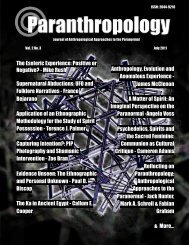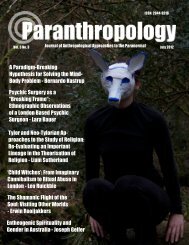Psi and Psychedelics - Paranthropology - Weebly
Psi and Psychedelics - Paranthropology - Weebly
Psi and Psychedelics - Paranthropology - Weebly
You also want an ePaper? Increase the reach of your titles
YUMPU automatically turns print PDFs into web optimized ePapers that Google loves.
Putting the <strong>Psi</strong> Back Into Psychedelic Research<br />
PARANTHROPOLOGY: JOURNAL OF ANTHROPOLOGICAL APPROACHES TO THE PARANORMAL VOL. 2 NO. 2<br />
research. It’s at this point that parapsychology <strong>and</strong> psychedelic research<br />
parted company. Parapsychologists, long suffering the brunt of zealous<br />
critics anyway, could no longer risk tarnishing their brush even more by<br />
associating with the likes of Leary. The few tenacious psychedelic researchers<br />
who kept the torch burning in their field also felt that what little credibility<br />
they had left could not be risked further by “dabbling in psi.” Both fields of<br />
research suddenly became too fringe for each other.<br />
This situation remained throughout much of the following decades<br />
<strong>and</strong> it wasn’t until the mid-1990s when a few brave researchers, such as<br />
the medical doctor Rick Strassman (2001), risked their careers to ask<br />
unaskable questions. Defying taboo, they persisted with ethics committees<br />
<strong>and</strong> government agencies for several years until they were given permission<br />
to once again conduct psychedelic research projects with humans. Initially,<br />
this occurred in only in a few very isolated pockets, but by the turn of the<br />
millennium there were a good number of psychedelic research projects<br />
that were starting to hatch, almost entirely for therapeutic purposes.<br />
This feat was helped in part by the formation of organisations like<br />
the Multidisciplinary Association for Psychedelic Studies (acronym MAPS),<br />
based in the U.S., <strong>and</strong> the Beckley Foundation, based in Oxford in the<br />
UK. These organisations fund-raised millions of euros from sympathetic<br />
supporters <strong>and</strong> philanthropists <strong>and</strong> channelled it into conducting<br />
respectable ethically approved institutional research with substances such<br />
as psilocybin, MDMA, cannabis, <strong>and</strong>, for the first time in nearly 40 years, a<br />
project initiated by the Beckley Foundation is investigating the beneficial<br />
effects of LSD on creativity <strong>and</strong> brain activity in humans.<br />
The current situation with human psychedelic research is such<br />
that it is experiencing the start of a complete renaissance, <strong>and</strong> there are<br />
currently projects running at several prestigious universities, including<br />
Harvard <strong>and</strong> Johns Hopkins, with a constant expansion of new institutions<br />
starting research (for a review, see Winkelman & Roberts, 2007). There’s<br />
even a team now at Yale <strong>and</strong> research planned at Oxford. This is something<br />
truly remarkable! Substances that were demonised <strong>and</strong> prohibited for study<br />
for several decades are beginning to make a return to academia, <strong>and</strong> not<br />
by changing their name or their effects. Although some researchers urged<br />
adopting the name entheogens to gain respectability, the vanguard of<br />
advocates continued to use the term psychedelic, even though for decades<br />
it had been loaded with negative baggage. I perceive there were two major<br />
factors that helped bring about this positive change. The first was the<br />
passage of time <strong>and</strong> the gradual demise of the media hysteria generated in<br />
the sixties. The second was the persistent affirmation by serious scientists,<br />
academics, <strong>and</strong> therapists who worked with these substances directly that<br />
they were essentially safe <strong>and</strong> had many potential benefits to be gained if<br />
they were used in the right way.<br />
The salient point here is that “at the length, truth will out!” Many<br />
people who had come into contact with psychedelics recognised their<br />
13 PARANTHROPOLOGY: JOURNAL OF ANTHROPOLOGICAL APPROACHES TO THE PARANORMAL<br />
227




